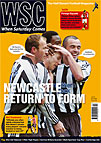 Referee Robert Hoyzer has caused chaos in Germany by admitting that he fixed matches for sex, money and high-value electrical goods, as Paul Joyce reports
Referee Robert Hoyzer has caused chaos in Germany by admitting that he fixed matches for sex, money and high-value electrical goods, as Paul Joyce reports
Bribery scandals have rocked German football before, not least during the 1970-71 season when more than 50 players were discovered to have manipulated the outcome of Bundesliga matches. Few believed, however, that the man in the middle could be involved in match-rigging until January 2005, when 25-year-old referee Robert Hoyzer admitted receiving €67,000 (and a plasma TV) for fixing the results of four matches, and attempting unsuccessfully to influence the outcome of two others.
Hoyzer claims to have received the cash, about £45,000, from three Berlin-based Croatian brothers who won large sums by betting on the rigged matches. Police raids on Café King, a Croatian bar in Berlin-Charlottenburg frequented by referees and players affiliated to Hertha Berlin, yielded betting receipts showing winnings of €2.7 million (£1.8m).
The most infamous of Hoyzer’s four matches was the first-round German Cup tie between third-division SC Paderborn 07 and Bundesliga ever-presents Hamburger SV in August 2004. Having been offered €20,000 to secure a victory for the underdog, the referee watched HSV race into a two-goal lead.
Undeterred, he awarded two penalties to Paderborn for non-existent fouls and sent off Hamburg striker Emile Mpenza for arguing, thus ensuring that the match finished 4-2 to Paderborn. It later emerged that Paderborn captain Thijs Waterink, whose Fosbury flop in the opponents’ area had permitted Hoyzer to award the first penalty, had been given €10,000 by “a gentleman with a southern appearance” which he was to distribute to his team in the event of victory.
Electing to co-operate with police enquiries, Hoyzer implicated numerous referees and 14 players from six clubs in the scandal. East German teams have come under particular suspicion, with former Energie Cottbus goalkeeper Georg Koch claiming to have rejected €20,000 to throw a second-division match last season against Jahn Regensburg. As yet only Hoyzer has admitted his guilt, although Dynamo Dresden players admit accepting €15,000 as an incentive to beat Preussen Münster in June 2003. Alongside matches in Austria, Greece and Italy, the Berlin connection is also believed to have targeted the UEFA Cup match between Panionios and Dinamo Tblisi in December 2004. Greek broadcaster SKAI reported that insiders in Georgia knew the final score of 5-2 two days before the match took place.
The handling of the scandal by the German Football Association, the DFB, has become part of the scandal itself. As the association declined to send referees’ observers to first-round cup matches such as Paderborn v HSV or to third-division matches officiated by referees who were qualified to work in a higher division, the DFB may never have rumbled Hoyzer at all had three fellow referees not reported their suspicions. Even though two third-division matches manipulated by Hoyzer occurred in 2003-04, the DFB still ranked him in the top third of second-division referees that season. It has also emerged that although the state-run betting company Oddset informed the DFB of its concerns about the Paderborn v HSV game, general secretary Horst R Schmidt failed to pass these on to the presidency or the referees’ section of the association. With Oddset committed to contribute €30m to the 2006 World Cup, the DFB has also had to endure criticism that it failed to pursue match-fixing inquiries for fear of losing Oddset’s sponsorship.
This is not the first time that the DFB has been slow to react to such allegations. In December 2004, handicap bets on Aue beating Oberhausen by a two-goal margin in a second-division game were ten times as high as usual. £500,000 was wagered on this unimportant game in England alone, mainly with Betfair. Aue duly won 2-0, thanks to an own goal and an unnecessarily conceded penalty, yet the DFB’s reluctant investigations into the affair were closed down after a few days due to lack of evidence.
Doubts have been raised as to the accuracy of Hoyzer’s confession, however, which was issued only two days after he had vehemently denied all charges and targets Felix Zwayer, the very referee who had blown the whistle on him in January. As HSV’s Bernd Hoffmann recently groaned: “We don’t have to follow every pig that Hoyzer drives through the village.” Not least because, finding himself in custody in February due to discrepancies in his initial statement, Hoyzer promptly remembered a number of fresh incidents.
These include his eye-opening contention that it was once “standard practice” for referees to be taken to brothels before football matches, citing personal experience of Leipzig lap-dancing bars in 2000. It’s perhaps surprising, therefore, that the DFB, for whom Hoyzer is the “most impressive informant” in the case, is using his confessions to decide which of the many disputed matches must now be replayed. As Hoyzer has admitted manipulating the game between Ahlen and Burghausen in November 2004, a rematch has been scheduled. But where no confession is present, the burden of proof falls on the affected clubs, with minimal hope of success. Appeals to extend the second division from 18 to 20 clubs this year have likewise fallen on deaf ears.
None of which helps Hamburger SV, whose request for a replay of their first-round cup match would have thrown a competition that has already reached the quarter-final stages into turmoil. Needing to pay former manager Klaus Toppmöller, who was sacked shortly after the Paderborn debacle, €150,000 per month until the end of the season, HSV withdrew their claim and accepted €2m in compensation. There’s no mention of whether a plasma TV was thrown in.
From WSC 218 April 2005. What was happening this month